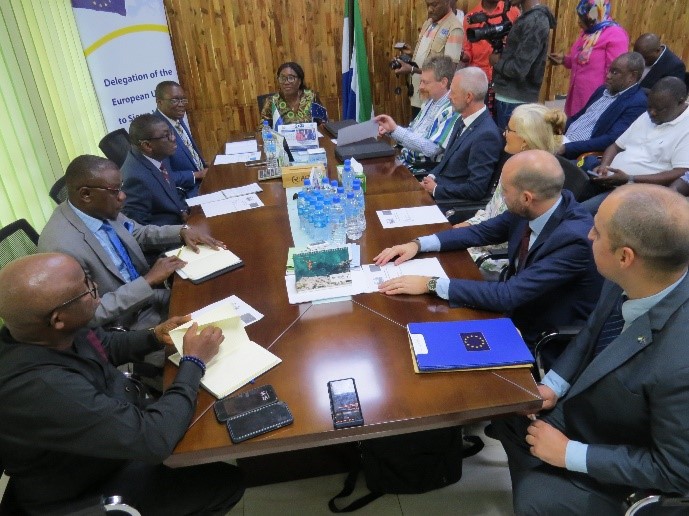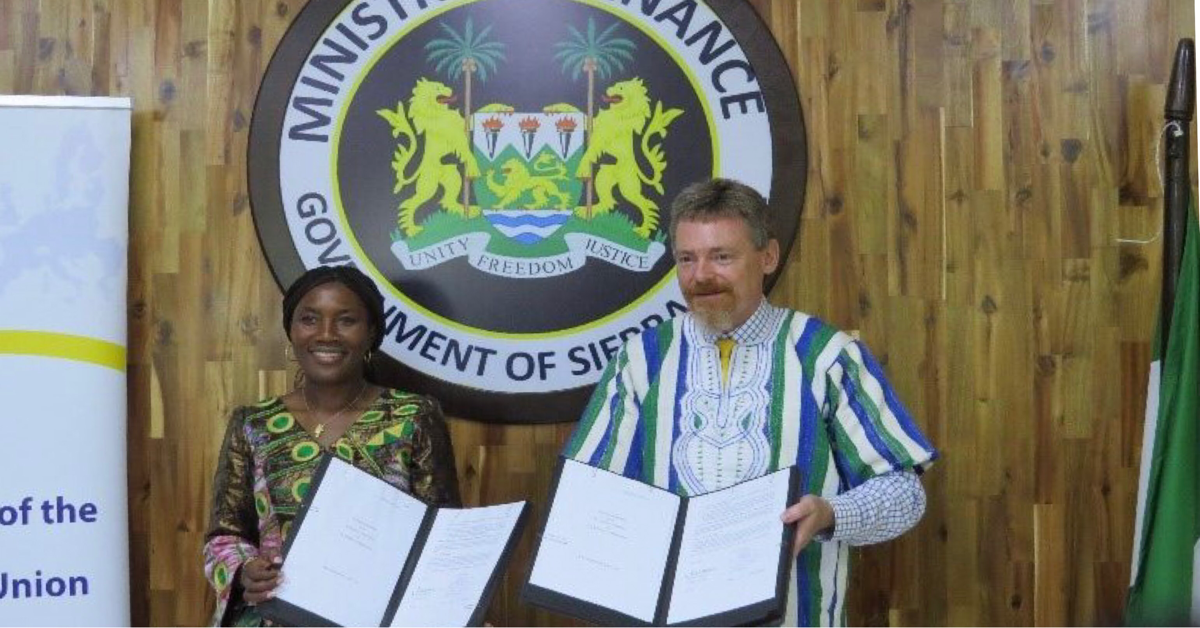In an agreement signing deal, the Ministry of Finance and the European Union (EU) agreed on a whopping €90 million financing agreement on the ‘Nature Nourishes Programme that sought to tackle environment protection and human capital development enhancement.
The partnership is set to represent a crucial milestone in the ongoing collaboration between the EU and Sierra Leone in the country.
A key aspect of this initiative is the Budget Support component, which earmarks €65 million over the next four years.
This allocation is particularly planned to improve Sierra Leone’s resilience to environmental challenges while simultaneously improving educational outcomes.
In alignment with the EU’s Global Gateway strategy, “Nature Nourishes” also emphasizes the provision of quality education for all children and youth, alongside efforts to enhance teacher competencies and skills.
the EU Ambassador to Sierra Leone, HE Manuel Mueller emphasized the EU’s commitment to helping Sierra Leone’s inclusive and endurable development through this agreement. He remarked that the allocation would be tied to the achievement of specific performance indicators, ensuring responsibility and substantial progress, especially in the areas of public finance surveillance and state budget oversight.
The EU Ambassador further stated that the European Union not only provies financial assistance to Sierra Leone but also actively supports the government in making substantial progress in key areas such as environmental protection, education, decentralization, tax collection, and food security.
At the signing ceremony held on Thursday, August 29, 2024, at the Ministry of Finance, Acting Minister of Finance Kadiatu Allie expressed profound gratitude to the EU for reinstating its budget support after a hiatus from 2021 to 2023. She acknowledged that the absence of EU budget support had posed significant challenges to budget implementation in Sierra Leone.
She further expressed how deeply appreciative she was of the EU’s decision to resume budget support operations under the ‘Nature Nourishes’ programme in 2024. She further emphasized that the reform areas under this financing agreement are closely aligned with the government’s key priorities, as outlined in the National Development Plan’s Big Five Game Changers.
She regurgitated the government’s obligation to execute the agreed indicators, not solely because they are tied to the disbursement of funds, but also because they are expected to contribute significantly to sustainable economic growth, job creation, and the overall resilience of the economy.
Financial Secretary, Matthew Dingie also conveyed his gratitude for the EU’s development aid, explaining that this allotment support is a grant, which does not increase the nation’s debt burden. He noted that of the total €90 million, €65 million is allocated for Budget Support, with the Central Bank responsible for implementation.
Dingie illustrated that the budget support will require cabinet approval and subsequent ratification by parliament. He also mentioned that the Ministry is already factoring some of the programme’s priorities into the ongoing 2025 bilateral budget discussions. The last instance of EU budget support, he recalled, was during the COVID-19 pandemic in 2020-2021.
Once approved, the funds will be disbursed through the Central Bank, with up to €15 million allocated annually to the relevant ministries and departments based on budget appropriations.
Environmental Protection: A major component of the “Nature Nourishes” initiative focuses on the restoration and management of Sierra Leone’s terrestrial biodiversity and ecosystems, particularly within national parks.
Key Objectives of the “Nature Nourishes” Programme:
Improving Education: Enhancing access to education and supporting the government’s Home-grown School Feeding Programme to ensure equitable learning outcomes across all educational levels.
Promoting Sustainable Agriculture: Supporting the “Feed Salone” initiative by promoting sustainable and eco-friendly agricultural practices, thereby improving health, nutrition, and food security.
Decentralization: Advancing the decentralization process to improve public service delivery at the local level, ensuring resources reach the communities most in need.
Public Financial Management (PFM) Reforms: Strengthening PFM systems for better revenue mobilization and budget execution.
This financing agreement not only marks the resumption of EU budget support but also signals a renewed commitment to sustainable development in Sierra Leone, with a focus on improving the lives of its citizens while safeguarding the environment.












